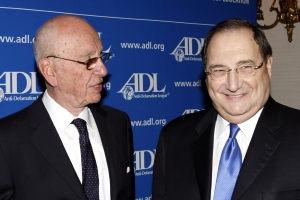
Rupert Murdoch (left) with Abraham Foxman of the Anti- Defamation League at a 2010 dinner in honor of the News Corp. chairman. JTA photo by David Karp Photography.
– Amid Murdoch scandal, Israel backers worry about muting of pro-Israel media voice (JTA, July 19, 2011)
– Israel backers worried about Murdoch’s pro-Israel media empire (Jewish Community Voice, July 27, 2011):
Pro-Israel leaders in the United States, Britain and Australia are warily watching the unfolding of the phone-hacking scandal that is threatening to engulf the media empire of Rupert Murdoch, founder of News Corp.
Murdoch’s sudden massive reversal of fortune—with 10 top former staffers and executives under arrest in Britain for hacking into the phones of public figures and a murdered schoolgirl, and paying off the police and journalists—has supporters of Israel worried that a diminished Murdoch presence may mute the strongly pro-Israel voice of many of the publications he owns.
“His publications and media have proven to be fairer on the issue of Israel than the rest of the media,” said Malcolm Hoenlein, the executive vice-chairman of the Conference of Presidents of Major American Jewish Organizations. “I hope that won’t be impacted.”
Murdoch’s huge stable encompasses broadsheets such as The Wall Street Journal, the Times of London and The Australian, as well as tabloids, most notably The Sun in Britain and the New York Post. It also includes the influential Fox News Channel in the United States and a 39 percent stake in British Sky Broadcasting, or BSkyB, a satellite broadcaster. Murdoch founded the neoconservative flagship The Weekly Standard in 1995, and sold it last year.
Jewish leaders said that Murdoch’s view of Israel’s dealings with the Palestinians and with its Arab neighbors seemed both knowledgeable and sensitive to the Jewish state’s self-perception as beleaguered and isolated.
“My own perspective is simple: We live in a world where there is an ongoing war against the Jews,” Murdoch said last October at an Anti-Defamation League dinner in his honor. “When Americans think of antisemitism, we tend to think of the vulgar caricatures and attacks of the first part of the 20th century. Now it seems that the most virulent strains come from the left. Often this new antisemitism dresses itself up as legitimate disagreement with Israel.”
Murdoch, 80, has visited Israel multiple times and met with many of its leaders. In 2009, he was honored by the American Jewish Committee.
“In the West, we are used to thinking that Israel cannot survive without the help of Europe and the United States,” he said at the AJC event. “Tonight I say to you, maybe we should start wondering whether we in Europe and the United States can survive if we allow the terrorists to succeed in Israel.”
Leaders of a number of pro- Israel groups declined to comment for this story because of Murdoch’s current difficulties. He and his son, James, have testified before a parliamentary committee in London.
Murdoch also has been seen as a friend of the Jews in the Diaspora, even though Fox has irritated the Jewish establishment for championing at times what many Jews perceive as the margins of right-wing thinking— for instance, when Fox host Bill O’Reilly defended Mel Gibson’s 2004 movie “The Passion of the Christ.”
When some Jewish organizational leaders complained that Fox talk show host Glenn Beck was relying on antisemitic tropes in peddling discredited theories about liberal billionaire financier George Soros, Murdoch nudged Fox chief Roger Ailes into meetings with Jewish leaders. Beck left Fox last month.
Murdoch’s affection for Israel arose less out of his conservative sensibility than from his native Australian sympathy for the underdog fending off elites seized by conventional wisdoms, according to Isi Liebler, a longtime Australian Jewish community leader who now lives in Israel.
“From my personal communications with him, it’s something that built up,” Liebler told JTA. “He’s met Israelis, he’s been to Israel, he’s seen Israel as the plucky underdog when the rest of the world saw Israel as an occupier.”
Australian Jews noted the pro-Israel cast of Murdoch’s papers as early as the 1970s, before he had established ties with the Jewish community. The word from inside his company was that Israel was an issue that he cared about, which helped shape its coverage in his media properties. Robert Fisk, a veteran Middle East correspondent and a fierce critic of Israel who worked for the Murdoch-owned Times of London from 1981 until 1988, eventually quit and moved to The Independent because of what he said was undue editorial interference in his writing. Recalling those days, Fisk said Murdoch’s influence trickled down through editors who understood that he wanted his media to reflect his outlook.